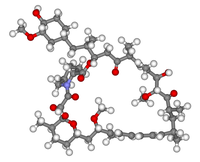
Photo from wikipedia
Recent studies have suggested that the hypothalamus has an important role in aging by regulating nuclear factor-?B (NF-?B)-directed gonadotropin-releasing hormone (GnRH) decline. Moreover, our previous study has shown that ischemia-reperfusion… Click to show full abstract
Recent studies have suggested that the hypothalamus has an important role in aging by regulating nuclear factor-?B (NF-?B)-directed gonadotropin-releasing hormone (GnRH) decline. Moreover, our previous study has shown that ischemia-reperfusion (IR) injury activates NF-?B to reduce hypothalamic GnRH release, thus suggesting that IR injury may facilitate hypothalamic programming of system aging. In this study, we further examined the role of phosphoinositide 3-kinase (PI3K)/Protein kinase B (Akt) pathway, a critical intracellular signal pathway involved in the repair process after IR, in hypoxia-reoxygenation (HR)-associated GnRH decline in vitro. We used GT1-7 cells and primarily-cultured mouse GnRH neurons as cell models for investigation. Our data revealed that the activation of the PI3K/Akt/Forkhead box protein O3a (FOXO3a) pathway protects GnRH neurons from HR-induced GnRH decline by preventing HR-induced gnrh1 gene inhibition and NF-?B activation. Our results further the understanding of the regulatory mechanisms of HR-associated hypothalamic GnRH decline.
Journal Title: Physiological research
Year Published: 2022
Link to full text (if available)
Share on Social Media: Sign Up to like & get
recommendations!